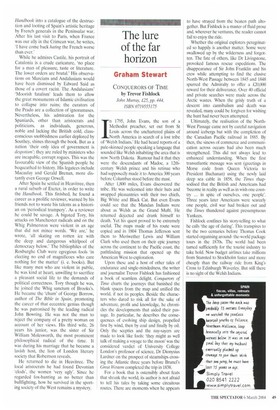The lure of the far horizon
Graham Stewart
CONQUERORS OF TIME by Trevor Fishlock John Murray, £25, pp. 444, ISBN 0719555175 In 1795, John Evans, the son of a Methodist preacher, set out from St Louis across the unchartered plains of North America in search of a lost tribe of 'Welsh Indians.' He had heard reports of a pale-skinned people speaking a language that sounded like Welsh inhabiting the area that is now North Dakota. Rumour had it that they were the descendants of Madoc, a 12thcentury Welsh prince and his retinue who had supposedly made it to America 300 years before Columbus stood before the mast.
After 1,800 miles, Evans discovered the tribe. He was welcomed into their huts and swapped pleasantries with their two chiefs, Big White and Black Cat. But even Evans could see that the Mandan Indians were about as Welsh as the Grand Mufti. He returned dejected and drank himself to death. Yet his quest proved to be extremely useful. The maps made of his route were copied and in 1804 Thomas Jefferson sent them to Meriwether Lewis and William Clark who used them on their epic journey across the continent to the Pacific coast, the pathfinding mission that opened up the American West to exploration.
Upon these and a host of other tales of endurance and single-mindedness, the writer and journalist Trevor Fishlock has fashioned a book of seamless delight. Conquerors of 7'ime charts the journeys that banished the blank spaces from the map and unified the world, if not its peoples. Beside the characters who dared to risk all for the sake of adventure, profit and knowledge, he chronicles the developments that aided their passage. In particular, he describes the consequences of evolving ship design, propelled first by wind, then by coal and finally by oil. Only the sceptics and the nay-sayers are made to look like fools: 'they might as well talk of making a voyage to the moon' was the considered verdict of University College London's professor of science, Dr Dionysius Lardner on the prospect of steamships crossing the Atlantic three years before Brunel's Great Western completed the trip in 1838.
For a book that is ostensibly about feats that shrank the world, its author is not afraid to tell his tales by taking some circuitous routes. There are moments when he appears to have strayed from the beaten path altogether. But Fishlock is a master of fluid prose and, wherever he ventures, the reader cannot fail to enjoy the ride.
Whether the original explorers peregrinated so happily is another matter. Some were swallowed up by the wilderness and forgotten. The fate of others, like Dr Livingstone, provoked famous rescue expeditions. The disappearance of Sir John Franklin and his crew while attempting to find the elusive North-West Passage between 1845 and 1848 spurred the Admiralty to offer a £20,000 reward for their deliverance. Over 40 official and private searches were made across the Arctic wastes. When the grisly truth of a descent into cannibalism and death was revealed, many could be forgiven for wishing the hunt had never been attempted.
Ultimately, the realisation of the NorthWest Passage came not by careful navigation around icebergs but with the completion of the Canadian Pacific railroad in 1885. By then, the sinews of commerce and communication across oceans had also been much strengthened. This did not always lead to enhanced understanding. When the first transatlantic message was sent (greetings in Morse code from Queen Victoria to President Buchanan) using the newly laid deep sea cable in 1858, the Times rhapsodised that the British and Americans had `become in reality as well as in wish one country ... in spite of ourselves, one people'. Three years later Americans were scarcely one people, civil war had broken out and the Times thundered against presumptuous Yankees.
Fishlock confines his story-telling to what he calls 'the age of daring'. This transpires to be the two centuries before Thomas Cook started organising aroundthe-world package tours in the 1870s. The world had been tamed sufficiently for the tourist industry to take hold. Now budget airlines take millions from Stansted to Stockholm faster and more cheaply than the railway ride from King's Cross to Edinburgh Waverley. But still there is no sight of the Welsh Indians.


















































































 Previous page
Previous page